

Quantum Physics. 'Theodicy' Theological attempt to resolve the problem of evil Gottfried Leibniz coined the term "theodicy" in an attempt to justify God's existence in light of the apparent imperfections of the world.
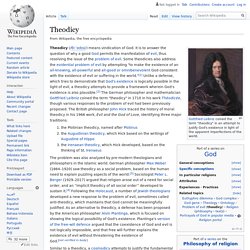
Theodicy () means vindication of God. 'Consequentialism' Consequentialism is usually distinguished from deontological ethics (or deontology), in that deontology derives the rightness or wrongness of one's conduct from the character of the behaviour itself rather than the outcomes of the conduct.

It is also distinguished from virtue ethics, which focuses on the character of the agent rather than on the nature or consequences of the act (or omission) itself, and pragmatic ethics which treats morality like science: advancing socially over the course of many lifetimes, such that any moral criterion is subject to revision. Consequentialist theories differ in how they define moral goods. Some argue that consequentialist and deontological theories are not necessarily mutually exclusive. For example, T.M. Consequentialist philosophies[edit] State consequentialism[edit] Mozi supported a communitarian form of consequentialism, rather than individual pleasure or pain.[4] Utilitarianism[edit] Georg Wilhelm Friedrich Hegel - Philosopher.
The birthplace of Hegel in Stuttgart, which now houses The Hegel Museum Georg Wilhelm Friedrich Hegel (German: [ˈɡeɔɐ̯k ˈvɪlhɛlm ˈfʁiːdʁɪç ˈheːɡəl]; August 27, 1770 – November 14, 1831) was a German philosopher, and a major figure in German Idealism.

His historicist and idealist account of reality revolutionized European philosophy and was an important precursor to Continental philosophy and Marxism. 'The Phenomenology of Spirit' Phänomenologie des Geistes (1807) is Georg Wilhelm Friedrich Hegel's most important and widely discussed philosophical work.
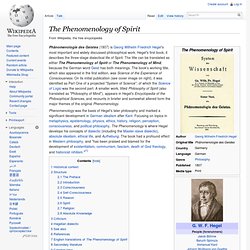
Hegel's first book, it describes the three-stage dialectical life of Spirit. The title can be translated as either The Phenomenology of Spirit or The Phenomenology of Mind, because the German word Geist has both meanings. The book's working title, which also appeared in the first edition, was Science of the Experience of Consciousness. On its initial publication (see cover image on right), it was identified as Part One of a projected "System of Science", of which the Science of Logic was the second part. A smaller work, titled Philosophy of Spirit (also translated as "Philosophy of Mind"), appears in Hegel's Encyclopedia of the Philosophical Sciences, and recounts in briefer and somewhat altered form the major themes of the original Phenomenology.
Historical context[edit] I saw the Emperor – this world-soul – riding out of the city on reconnaissance. Aristotle - Philosopher. Aristotle's views on physical science profoundly shaped medieval scholarship.
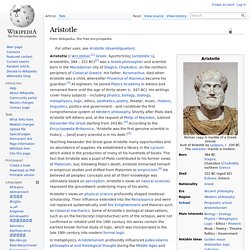
Their influence extended into the Renaissance and were not replaced systematically until the Enlightenment and theories such as classical mechanics. Plato - Philosopher. Plato (/ˈpleɪtoʊ/; Greek: Πλάτων Plátōn "broad"pronounced [plá.tɔːn] in Classical Attic; 428/427 or 424/423 – 348/347 BCE) was a philosopher, as well as mathematician, in Classical Greece.
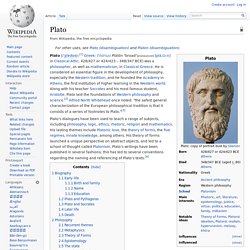
'Allegory of the Cave' Plato has Socrates describe a gathering of people who have lived chained to the wall of a cave all of their lives, facing a blank wall.

The people watch shadows projected on the wall by things passing in front of a fire behind them, and begin to designate names to these shadows. Socrates - Philosopher. Socrates (/ˈsɒkrətiːz/;[2] Greek: Σωκράτης [sɔːkrátɛːs], Sōkrátēs; 470/469 – 399 BC)[1] was a classical Greek (Athenian) philosopher credited as one of the founders of Western philosophy.
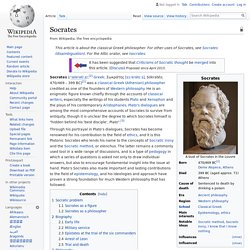
He is an enigmatic figure known chiefly through the accounts of classical writers, especially the writings of his students Plato and Xenophon and the plays of his contemporary Aristophanes. Plato's dialogues are among the most comprehensive accounts of Socrates to survive from antiquity, though it is unclear the degree to which Socrates himself is "hidden behind his 'best disciple', Plato".[3] Through his portrayal in Plato's dialogues, Socrates has become renowned for his contribution to the field of ethics, and it is this Platonic Socrates who lends his name to the concepts of Socratic irony and the Socratic method, or elenchus. Socratic problem Nothing written by Socrates remains extant. Socrates as a figure Socrates as a philosopher Biography Early life Military service. Philosophy - Definition.
Philosophy is the study of general and fundamental problems, such as those connected with reality, existence, knowledge, values, reason, mind, and language.[1][2] Philosophy is distinguished from other ways of addressing such problems by its critical, generally systematic approach and its reliance on rational argument.[3] In more casual speech, by extension, "philosophy" can refer to "the most basic beliefs, concepts, and attitudes of an individual or group".[4] The word "philosophy" comes from the Ancient Greek φιλοσοφία (philosophia), which literally means "love of wisdom".[5][6][7] The introduction of the terms "philosopher" and "philosophy" has been ascribed to the Greek thinker Pythagoras.[8] Areas of inquiry Philosophy is divided into many sub-fields.

Gautama Buddha - Philosopher. The word Buddha means "awakened one" or "the enlightened one".
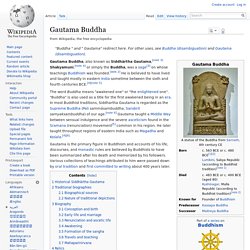
"Buddha" is also used as a title for the first awakened being in an era. In most Buddhist traditions, Siddhartha Gautama is regarded as the Supreme Buddha (Pali sammāsambuddha, Sanskrit samyaksaṃbuddha) of our age. [note 6] Gautama taught a Middle Way between sensual indulgence and the severe asceticism found in the Sramana (renunciation) movement common in his region. He later taught throughout regions of eastern India such as Magadha and Kośala. Gautama is the primary figure in Buddhism and accounts of his life, discourses, and monastic rules are believed by Buddhists to have been summarized after his death and memorized by his followers. Historical Siddhārtha Gautama[edit] 'Karma' Endless knot Nepalese temple prayer wheel Karma symbols such as endless knot (above) are common cultural motifs in Asia.
Endless knots symbolize interlinking of cause and effect, a Karmic cycle that continues eternally. The endless knot is visible in the center of the prayer wheel. Karma (Sanskrit: कर्म; IPA: [ˈkərmə]; Pali: kamma) means action, work or deed;[1] it also refers to the spiritual principle of cause and effect where intent and actions of an individual (cause) influence the future of that individual (effect).[2] Good intent and good deed contribute to good karma and future happiness, while bad intent and bad deed contribute to bad karma and future suffering.[3][4] Karma is closely associated with the idea of rebirth in some schools of Asian religions.[5] In these schools, karma in the present affects one's future in the current life, as well as the nature and quality of future lives - or, one's saṃsāra.[6] Etymology.
'Stoicism'. School of Hellenistic Greek philosophy Stoicism is a school of Hellenistic philosophy which was founded by Zeno of Citium, in Athens, in the early 3rd century BC. Stoicism is a philosophy of personal ethics informed by its system of logic and its views on the natural world. According to its teachings, as social beings, the path to eudaimonia (happiness) for humans is found in accepting the moment as it presents itself, by not allowing oneself to be controlled by the desire for pleasure or fear of pain, by using one's mind to understand the world and to do one's part in nature's plan, and by working together and treating others fairly and justly.
Stoicism flourished throughout the Roman and Greek world until the 3rd century AD, and among its adherents was Emperor Marcus Aurelius. It experienced a decline after Christianity became the state religion in the 4th century AD. 'Ontology'. Study of the nature of being, becoming, existence or reality, as well as the basic categories of being and their relations Parmenides was among the first to propose an ontological characterization of the fundamental nature of reality. Etymology[edit] 'Metaphysics'. Metaphysics is a traditional branch of philosophy concerned with explaining the fundamental nature of being and the world that encompasses it,[1] although the term is not easily defined.[2] Traditionally, metaphysics attempts to answer two basic questions in the broadest possible terms:[3] Ultimately, what is there?
What is it like? Prior to the modern history of science, scientific questions were addressed as a part of metaphysics known as natural philosophy. Originally, the term "science" (Latin scientia) simply meant "knowledge". The scientific method, however, transformed natural philosophy into an empirical activity deriving from experiment unlike the rest of philosophy. Etymology[edit] However, once the name was given, the commentators sought to find intrinsic reasons for its appropriateness. Central questions[edit] 'Axiology' History[edit] Between the 5th and 6th century B.C., it was important in Greece to be knowledgeable if you were to be successful. Philosophers began to recognize that differences existed between the laws and morality of society. Socrates held the belief that knowledge had a vital connection to virtue, making morality and democracy closely intertwined. Socrates' student, Plato furthered the belief by establishing virtues which should be followed by all.
John Rawls - Philosopher. John Bordley Rawls (/rɔːlz/;[1] February 21, 1921 – November 24, 2002) was an American philosopher and a leading figure in moral and political philosophy. He held the James Bryant Conant University Professorship at Harvard University and the Fulbright Fellowship at Christ Church, Oxford. Veil of ignorance. The veil of ignorance, along with the original position, is a concept that has been in use by other names for centuries by philosophers such as John Stuart Mill, John Rawls, and Immanuel Kant whose work discussed the concept of the social contract.
John Harsanyi helped to formalize the concept in economics.[1][2] The modern usage was developed by John Rawls in A Theory of Justice.[3][4] It is a method of determining the morality of a certain issue (e.g., slavery) based upon the following thought experiment: parties to the original position know nothing about their particular abilities, tastes, and position within the social order of society.
The veil of ignorance blocks off this knowledge, such that one does not know what burdens and benefits of social cooperation might fall to him/her once the veil is lifted. 'Cognitive Dissonance'. In psychology, cognitive dissonance is the mental stress or discomfort experienced by an individual who holds two or more contradictory beliefs, ideas, or values at the same time, or is confronted by new information that conflicts with existing beliefs, ideas, or values.[1][2] Leon Festinger's theory of cognitive dissonance focuses on how humans strive for internal consistency.
When inconsistency (dissonance) is experienced, individuals tend to become psychologically uncomfortable and they are motivated to attempt to reduce this dissonance, as well as actively avoiding situations and information which are likely to increase it.[1] Relationship between cognitions[edit] Individuals can adjust their attitudes or actions in various ways. Adjustments result in one of three relationships between two cognitions or between a cognition and a behavior.[1] Friedrich Nietzsche - Philosopher. Friedrich Wilhelm Nietzsche (/ˈniːtʃə/[1] or /ˈniːtʃi/;[2] German: [ˈfʁiːdʁɪç ˈvɪlhɛlm ˈniːt͡sʃə]; 15 October 1844 – 25 August 1900) was a German philosopher, cultural critic, poet, composer and Latin and Greek scholar.
He wrote several critical texts on religion, morality, contemporary culture, philosophy and science, displaying a fondness for metaphor[3] and irony. Philosophy of Friedrich Nietzsche. Friedrich Nietzsche developed his philosophy during the late 19th century. He owed the awakening of his philosophical interest to reading Arthur Schopenhauer's Die Welt als Wille und Vorstellung (The World as Will and Representation, 1819, revised 1844) and admitted that Schopenhauer was one of the few thinkers that he respected, dedicating to him his essay Schopenhauer als Erzieher (Schopenhauer as Educator), published in 1874 as one of his Untimely Meditations.
Common themes in his thought can, however, be identified and discussed. 'Existentialism'. Existentialism is a term applied to the work of certain late 19th- and 20th-century philosophers who, despite profound doctrinal differences,[1][2][3] shared the belief that philosophical thinking begins with the human subject—not merely the thinking subject, but the acting, feeling, living human individual.[4] In existentialism, the individual's starting point is characterized by what has been called "the existential attitude", or a sense of disorientation and confusion in the face of an apparently meaningless or absurd world.[5] Many existentialists have also regarded traditional systematic or academic philosophies, in both style and content, as too abstract and remote from concrete human experience.[6][7] Definitional issues and background[edit] There has never been general agreement on the definition of existentialism.
The term is often seen as an historical convenience as it was first applied to many philosophers in hindsight, long after they had died. 'Aesthetics'. "Aesthetician" redirects here.